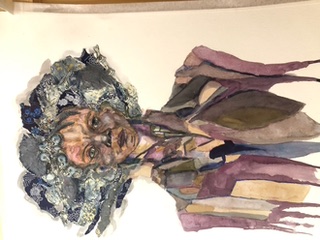Feminist Research Speaker Series
WINTER TERM 2025

Valentine's Day with Feminism
Aphra Behn to Ali Wong: 350 Years of Feminist Comedy on Stage
Wednesday, February 12, 2025, 2:00 pm MST
Location: Humanities Centre 2-37
In this talk, Dr. Willow White explores the evolution of feminist comedy on stages from the Restoration period to the present, tracing a line from Aphra Behn, England’s first professional woman playwright, to contemporary comic writers and performers like Ali Wong, Hannah Gadsby, Issa Rae, and many more. White examines how women and gender-diverse people use comedy to subvert gender norms, challenge patriarchal expectations, and advocate for bodily autonomy and liberation. By analyzing texts and performances, White considers how comedy has been a source of feminist critique across 350 years. In an era of increasing gender inequality, feminist comedy is a crucial site of self-expression, resistance, and advocacy.
Bio: Willow White is a feminist literary historian and assistant professor of English and Indigenous Studies at the University of Alberta, Augustana Faculty. She is the author of Feminist Comedy: Women Playwrights of London (Delaware 2024) and co-editor of A Narrative of the Life of Mrs. Mary Jemison (Broadview 2022). White is a member of the Métis Nation of Alberta with ancestral ties to Red River homeland through the Inkster, Sutherland, Cook, and Anderson families. Her current SSHRC-funded research recovers the contributions of Indigenous women of North America to seventeenth-century English performance culture.

Radical Feminism Revisited: 25 Years Later
Barbara Crow, Queen’s University
Friday, January 31, 2:00 pm MST
Location: Assiniboia Hall 3-30
Abstract: In the late nineties, and as an assistant professor in Women’s Studies, I spent several years in various women’s and feminist archives in the United States culling for original radical feminist texts. I did so to address and disrupt the homogenous, individuated and negative representations and perceptions of radical feminists and radical feminism. This archival work resulted in the publication Radical Feminism with New York University Press, 2000 – a collection still in print. It included original radical feminist texts by Valerie Solanas, Toni Cade Bambara and the Redstockings. I organized the collection around feminist themes to demonstrate the intersectionality and interconnectedness of radical feminism. Twenty-five years later there are parallels with the transgender movement as it continues to be subject to the same negative representation and strategies. In this paper, I will reflect on the continued conservatism haunting progressive gender tropes, what we can learn from radical feminism twenty-five years later, and draw on Hemmings’ insight about putting sex and gender “back together and insisting on their relation as one of power and authority” (2022, p. 615).
References: Crow, Barbara. Radical Feminism: A Documentary Reader. New York: New York University Press, 2000.
Hemmings, Clare. ”But I thought we’d already won that argument!”: “Anti-gender Mobilizations, Affect, and Temporality,” Feminist Studies, Vol. 48, No. 3, 2022, 594-615.
Bio: Barbara Crow is a feminist scholar. For the last two decades, she has held various administrative positions in research, graduate education and most recently the Dean of Arts and Science at Queen’s University (2017-2024). Crow has published in the areas of gender/women’s studies and digital technologies. For the last decade, she has been a co-investigator on a SSHRC international partnership grant on ageing and technology, https://actproject.ca and Aging in Data, https://agingindata.ca.
FALL TERM 2024

Verified Girls™️ Only Beyond This Point: Automatic Gender Recognition and the Play of Being a Bad Copy
Thursday, November 21, 2024 3:30 - 5:00 pm MST
Location: Assiniboia Hall 3-30
NOTE: DATE CHANGE
PB Berge, Assistant Professor, Women’s and Gender Studies and Media Technology Studies
In 2020, social application Giggle launched to public infamy. Claiming to be a “safe space for females!” the app featured an exclusive verification system: “[Giggle’s] Bio-metric gender verification software ensures that those within the platform are verified girls… It’s science!... Unfortunately, it doesn’t verify trans girls.” Giggle quickly gained notoriety as an app run by and for anti-trans extremists. Yet, in the weeks following its launch, trans folk on Twitter began co-opting Giggle’s facial recognition tool as a plaything; trans users posted celebratory selfies that passed Giggle’s verification system in mockery of the TERF talking point “we can always tell” and shared screenshots of angry reviews left by cisgender women unable to pass Giggle’s verification test.
In this talk, Dr. PB Berge articulates a practice called un-recognizing play—finding play in being unrecognizable and in unraveling malicious fantasies of authenticity, verification, and computational ontology. Drawing from work by trans artists, hackers, and scholars (cárdenas, 2021; Pozo 2018; Ferreira Da Silva, 2018), Berge argues that un-recognizing play abrogates technophysiognomic systems and creates opportunities for playing in the unlivable. Specifically, they examine algorithmic artist @ada_ada_ada’s project, the misgendering machine (Ada, 2023), which documents her manipulation of gender-detection algorithms in real time. Ada’s work plays at the boundaries of face- and body-recognition technology by exposing their mercuriality. Exploring the software used by the Giggle app to capture faces in conjunction with Ada’s work, Berge argues that un-recognizing play interrogates the logics of facial surveillance. By vitiating gendered algorithmic systems’ ability to govern themselves, such play suggests that, rather, “we can never tell.”

Ma(r)king the Nonbinary Body: Endurance and Belonging in Ultra-distance Running
Friday November 29, 2024 2:00 -3:30 pm MST NOTE TIME CHANGE!
Location: Assiniboia Hall 3-30
Dr. Simone Pfleger, Department of Women's and Gender Studies
Co-presented with artist: Slovia
This talk focuses on Dr. Pfleger's project on nonbinary sporting bodies in ultra-distance trail racing. In the talk, they seek to bridge theory and practice by engaging critically with questions of body politics, weaving together gender and queer theoretical academic discourses and personal lived experiences. Dr. Pfleger will consider what it means for nonbinary people to participate in a highly gendered sport and what their experiences might reveal about equity, diversity, and inclusion of all bodies not only in specific sporting events but also for society at large.